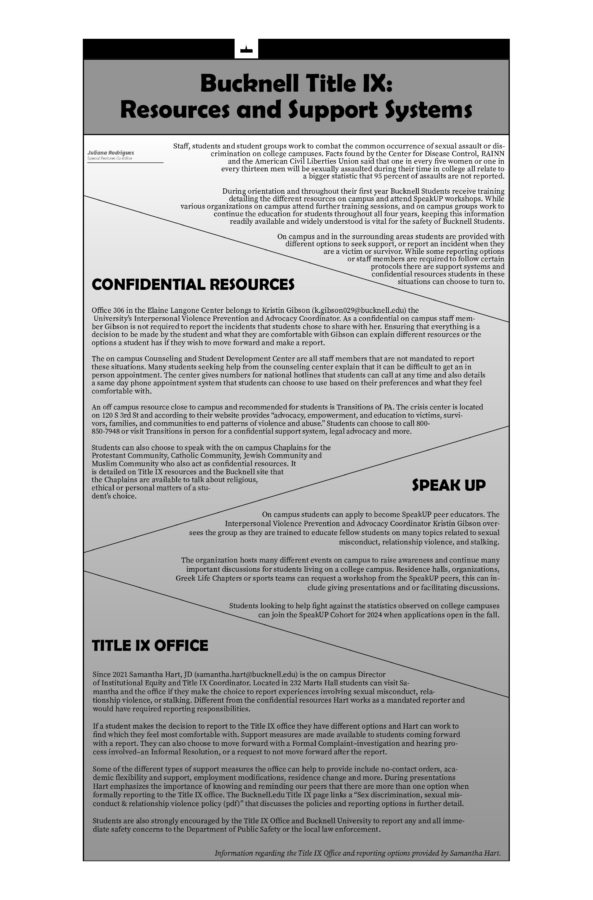Bucknell Title IX: Resources and Support Systems
February 24, 2023
Staff, students and on-campus groups work to combat the common occurrence of sexual assault and discrimination on college campuses. Facts found by the Center for Disease Control, RAINN and the American Civil Liberties Union said that one in every five women and one in every 13 men will be sexually assaulted during their time in college. These relate to a bigger statistic that 95 percent of assaults are not reported.
During orientation and throughout their first year, Bucknell students receive training detailing different resources on campus and attend SpeakUp workshops. While various organizations on campus attend further training sessions and groups work to continue student education throughout all four years, keeping this information readily available and widely understood is vital for the safety of Bucknell students.
On campus and in the surrounding areas, students are provided with different options to seek support or report an incident. While some reporting options or staff members are required to follow certain protocols, there are confidential resources students in these situations can choose to turn to.
Confidential Resources
Office 306 in the Elaine Langone Center belongs to Kristin Gibson (kg029@bucknell.edu), the University’s Interpersonal Violence Prevention and Advocacy Coordinator. As a confidential on-campus staff member, Gibson is not required to report the incidents that students chose to share with her. Ensuring that everything is a decision to be made according to students’ comfort levels, Gibson can explain different resources or the options a student has if they wish to move forward and make a report.
The Counseling and Student Development Center is made up of staff members who are not mandated to report these situations. Many students seeking help from the counseling center explain that it can be difficult to get an in-person appointment. The center gives numbers for national hotlines that students can call at any time and also details a same day phone appointment system that students can choose to use based on their preferences and what they feel comfortable with.
An nearby off-campus resource recommended for students is Transitions of PA. The crisis center is located on 120 S 3rd St. and according to their website provides “advocacy, empowerment, and education to victims, survivors, families and communities to end patterns of violence and abuse.” Students can choose to call 800-850-7948 or visit Transitions in person for a confidential support system, legal advocacy and more.
Students can also choose to speak with the on-campus Chaplains for the Protestant Community, Catholic Community, Jewish Community and Muslim Community who also act as confidential resources. It is detailed on Title IX resources and the Bucknell site that the Chaplains are available to talk about religious, ethical or personal matters of a student’s choice.
SpeakUp
Students can apply to become SpeakUp peer educators. Kristin Gibson oversees the group as they are trained to educate fellow students on many topics related to sexual misconduct, relationship violence and stalking.
The organization hosts many different events on campus to raise awareness and continue facilitating important discussions for students living on a college campus. Residence halls, organizations, Greek Life Chapters or sports teams can request a workshop from the SpeakUp peers.
Students looking to help fight against the statistics observed on college campuses can join the SpeakUp Cohort for 2024 when applications open in the fall.
Title IX Office
Since 2021, Samantha Hart, JD (sh057@bucknell.edu) is the Director of Institutional Equity and Title IX Coordinator. Located in 232 Marts Hall, students can visit Hart and the office if they make the choice to report experiences involving sexual misconduct, relationship violence or stalking. Different from the confidential resources, Hart works as a mandated reporter with required reporting responsibilities.
If a student makes the decision to report to the Title IX office, they have different options. Hart works to find which they feel most comfortable with. Support measures are made available to students coming forward with a report. They can also choose to move forward with a Formal Complaint, an Informal Resolution or a request to not move forward after the report.
Some of the different types of support measures the office can help to provide include no-contact orders, academic flexibility and support, employment modifications, residence change and more. During presentations, Hart emphasizes the importance of knowing and reminding our peers that there is more than one option when formally reporting to the Title IX office. Bucknell’s Title IX page links a “sex discrimination, sexual misconduct & relationship violence policy (pdf)” that discusses the policies and reporting options in further detail.
Students are also strongly encouraged by the Title IX Office and Bucknell University to report any and all immediate safety concerns to the Department of Public Safety or the local law enforcement.
Information regarding the Title IX Office and reporting options provided by Samantha Hart.






















